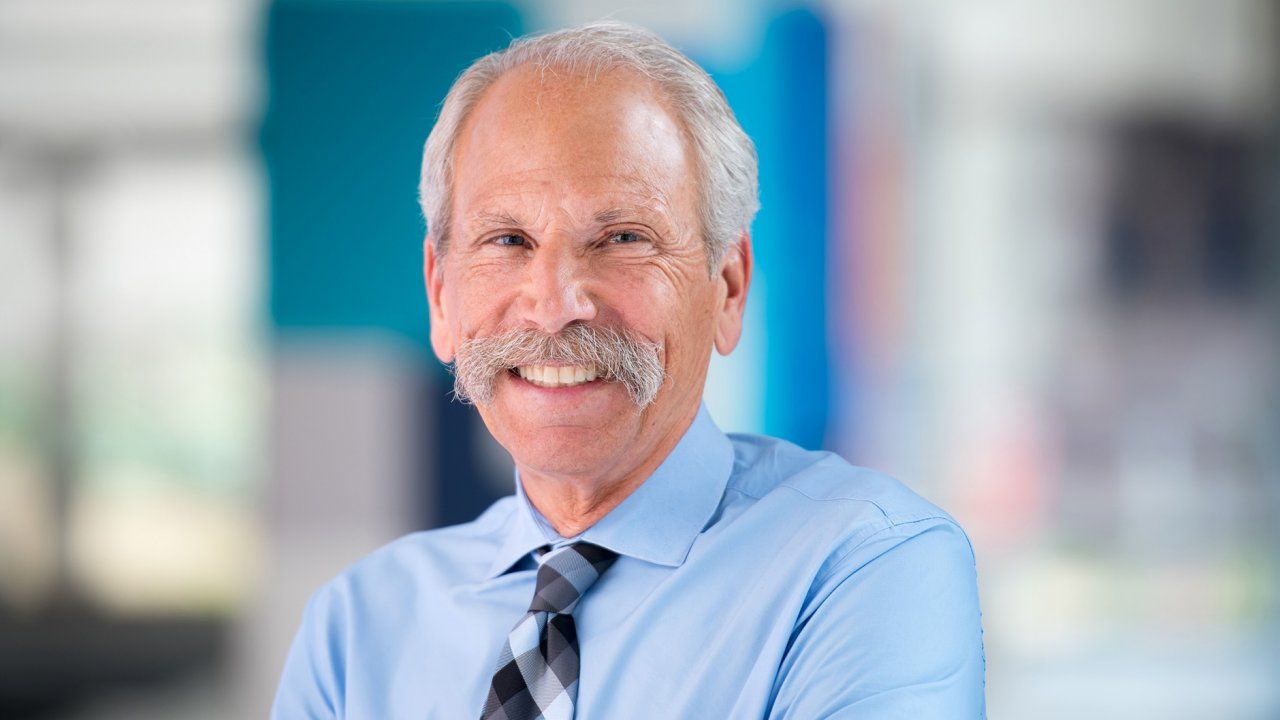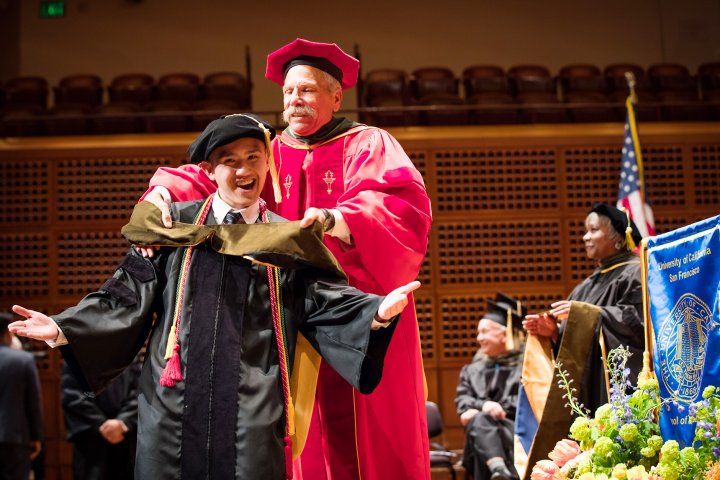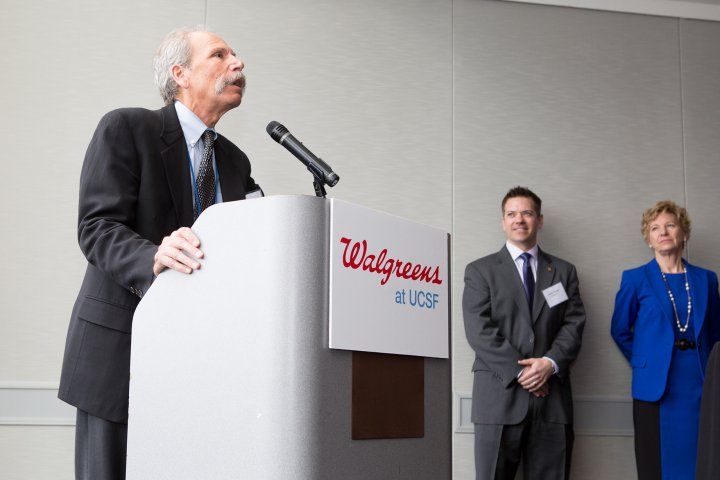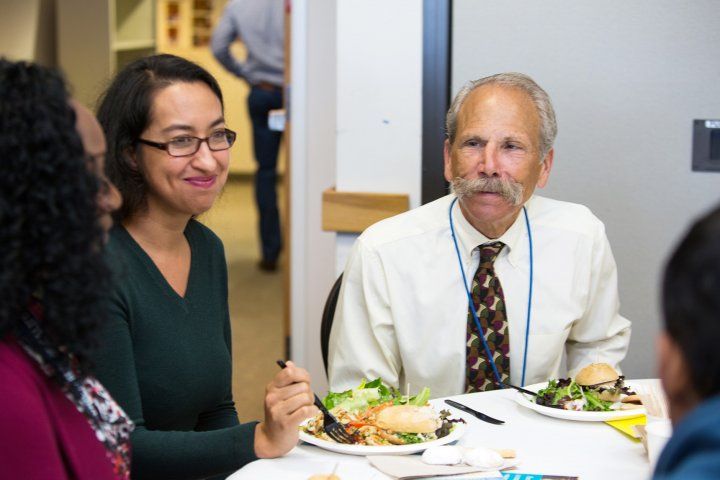UCSF School of Pharmacy Dean B. Joseph Guglielmo Announces Plan to Retire

Photo by Barbara Ries
After more than four decades at UC San Francisco, B. Joseph Guglielmo, PharmD, dean of the UCSF School of Pharmacy, who has led for nearly 10 years what is widely regarded as the best pharmacy school in the nation, has announced that he will retire Dec. 31, 2021.
Guglielmo arrived at UCSF in 1978 as a pharmacy resident and joined the faculty the next year. He has served as the School of Pharmacy dean since 2012. He is also the associate vice chancellor for pharmacy affairs and the Troy C. Daniels Distinguished Professor in Pharmaceutical Science.
Under his leadership, the School of Pharmacy had numerous achievements, including extending its streak as a leader in National Institutes of Health research funding, launching the Quantitative Biosciences Institute, and completely revamping the school’s curriculum.
“I would like to congratulate Joe for an exceptional career at UCSF,” said Chancellor Sam Hawgood, MBBS. “His work across all of our mission areas, from education to research, patient care to community involvement, will carry on far into the future. I am grateful for his dedication, leadership and all of his contributions to UCSF.”
But Guglielmo is quick to point out that he didn’t accomplish things alone.
“Credit for any and all accomplishments these past 10 years rests completely upon the efforts of a talented, committed faculty and staff,” he said.
Research, Education, and Clinical Excellence
The UCSF School of Pharmacy leads via its departments of pharmaceutical chemistry, bioengineering and therapeutic sciences, and clinical pharmacy, and an organized research unit, the Quantitative Biosciences Institute. Its roles extend from basic biological research that could lead to new therapies, to improving the safe, effective use of drugs, and to educating future pharmacists and researchers.
For the past 41 consecutive years, the School of Pharmacy has ranked number one in NIH research funding among the nation’s pharmacy schools. To Guglielmo, this extraordinary record is a testament not only to the high quality of research produced by the school, but to a guiding scientific mindset deeply embedded in the school.
“It’s not only the NIH funding or being featured on the covers of Science, Cell, and Nature,” he said. “Our science has stimulated a scientific way of thinking that is evident in all aspects of the academic mission.”

School of Pharmacy Dean B. Joseph Guglielmo, PharmD, hoods pharmacy student Drake Dinh in the 2019 commencement ceremony. Photo by Elisabeth Fall
Among the changes guided by such a scientific mindset was the complete revamping of the PharmD curriculum, which began during Guglielmo’s tenure. With the 2018 incoming class, the PharmD program changed from a four-year curriculum to a three-year inquiry-based curriculum that emphasized integrating classroom and clinical learning and removed grades. The transition to the new curriculum meant that this spring, the school minted two classes: the last class to graduate from the four-year program, and the first class to graduate from the new three-year program.
Guglielmo said that one reason he waited to announce his retirement was to see through this major curriculum transition.
The School of Pharmacy consistently places at the top of the U.S. News & World Report rankings of best graduate schools, with the school’s PharmD program being ranked No. 2 in the nation in 2020, the most recent year that the magazine ranked pharmacy programs. Moreover, the majority of its PharmD program’s graduates go on to residencies, with match rates well above the national average.
A reputation for a scientific way of thinking also explains the creation of the statewide California Poison Control System, which reports to the School of Pharmacy, a model of poison prevention not found anywhere else. The poison control system fields some 900 calls a day through the state’s hotline, and has multidisciplinary teams of pharmacists, nurses, and others working together to manage prevention and treatment.
The campus-wide pharmacy enterprise between the school and the UCSF Health Department of Pharmaceutical Services, led by chief pharmacy executive Desi Kotis, PharmD, and Department of Clinical Pharmacy chair Lisa Kroon, PharmD, has collaboratively developed a number of pharmaceutical models of care that have improved the safe, effective, and cost-effective use of medicines.
And to help drive the research to develop novel diagnostics and therapies for diseases, the school has been innovative in its thinking, including launching, in 2016, the Quantitative Biosciences Institute, known as QBI. Together with Nevan Krogan, PhD, Guglielmo established the institute, which has fostered cutting-edge, collaborative research across the biomedical and physical sciences, including critical research on COVID-19.
An Accomplished Four Decades
Guglielmo is an accomplished pharmacist, clinical scientist, and international expert in the evidence-based use of antimicrobials to treat infections.
He developed his interest in antimicrobials during his first job at UCSF as a clinical pharmacist working with surgical teams, spending much of his time in the ICU with the sickest patients.

Dean Guglielmo speaks during the 2014 opening of Walgreens at UCSF – a collaboration to explore new models of patient-centered care. Photo by Elisabeth Fall
“Every patient in that ICU was on antibiotics; for some, the therapy was completely appropriate while for others it clearly was not,” he recalled. “There was a lot of misuse and abuse of antibiotics in those days.” That experience led him and Richard Jacobs, MD, PhD, to form the UCSF Medical Center Antimicrobial Management Program in the late 1980s. They didn’t know at the time that they were pioneering what are now referred to as antimicrobial stewardship programs (ASPs) and standard in all academic medical centers.
“My job, and I believe any pharmacist’s job today, is to ensure that every patient is on the right medications, and that they are as safe and effective as possible,” said Guglielmo.
His clinical experience has guided his extensive research career, ranging from kinetics studies of where antimicrobials go in the body to epidemiological studies on the risk factors for multiple-resistant bacteria.
Throughout, Guglielmo also has taught countless courses and mentored students and trainees across pharmacy and medicine. He is the recipient of many teaching awards, including the UCSF Lifetime Achievement in Mentoring Award, Resident Preceptor of the Year Awards, UCSF School of Pharmacy Long Teaching Awards, and UCSF Academic Senate Distinction in Teaching Award.
He likes to describe himself as an “imperfectionist.”
“I didn’t have to be great at everything, I just had be good enough. I felt I was always a Jack of all trades,” he said. That, and a talent for bringing people together to create consensus, inevitably led him into administration.
In 2006, he became chair of the School of Pharmacy’s Department of Clinical Pharmacy, and for a time, he was also simultaneously interim director of UCSF Medical Center’s pharmaceutical services.
In 2007, Guglielmo formed the UCSF Medication Outcomes Center to improve medication use and management in the UCSF Medical Center and beyond. He also developed clinical pharmacy services for UCSF's HIV/AIDS program, specifically supporting the HIV Women's Program and the Men of Color Program.

Dean Guglielmo speaks with UCSF employees and faculty during the 2016 Faculty Development Day. Photo by Elisabeth Fall
In 2012, Guglielmo was appointed to be interim dean of the School of Pharmacy and asked to be on the search committee for the next dean after the retirement of Mary Anne Koda-Kimble, PharmD. He recalls he was on an out-of-town trip to give a lecture to primary care physicians on the appropriate use of antibiotics, when he got a call to his hotel room. “This Australian-accented gentleman, Sam Hawgood, who was then dean of the School of Medicine and chair of the search committee, said, ‘Joe, I’m asking you to throw your hat in the ring.’”
Guglielmo was officially named dean of the school in 2013.
As dean, Guglielmo has continued to promote therapeutics research, forged relationships among clinical, basic and translational scientists, and advocated for expanding the role of pharmacists in health care to reduce medication errors.
As he announced his retirement, Guglielmo offered his advice to the next dean: “Don’t worry about filling anybody’s shoes. You will be better than me in some ways and worse than me in others, and that’s the way it should be. Enjoy the ride. You could not have a better support system, both from above and below.”